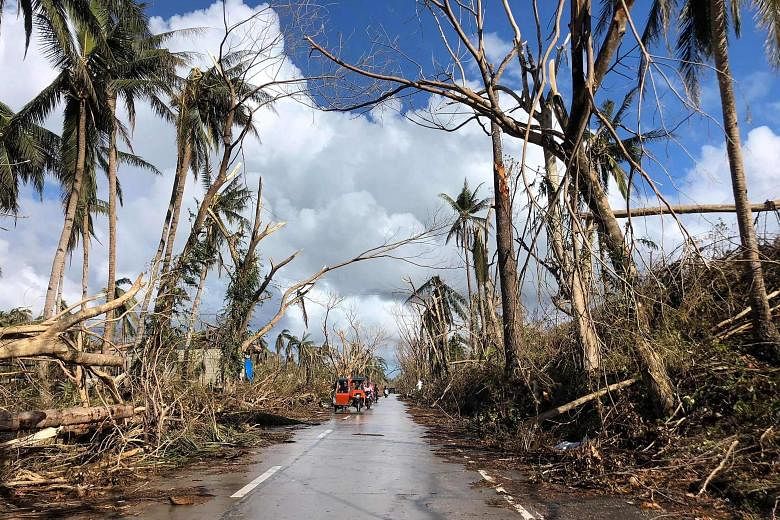MANILA (PHILIPPINE DAILY INQUIRER/ASIA NEWS NETWORK) - In parts of Visayas and Mindanao, the Christmas holiday that families and communities have been looking forward to as a break from the country's grinding pandemic hardships has just been obliterated.
Super typhoon Odette barrelled through central and southern Philippines last week after its first landfall on Thursday (Dec 16), with 3,286 villages and more than 1.81 million individuals finding themselves directly on its path.
The images resulting from that catastrophe are grim and the figures heartbreaking: At least 208 people dead per the latest reports; initial damage to infrastructure put at 20 billion peso (S$548 million); 3.8 million individuals living below the poverty line directly affected, with more than 400,000 of them fleeing their homes for higher and safer ground.
Odette, the 15th typhoon to ravage the country this year, made landfall at least nine times from Dec 16 to 17, packing maximum winds of 240 kph and dumping torrential rains that washed away roads and bridges and buried homes and people in mud.
The storm ripped roofs off homes and buildings, knocked down power lines and communication towers, uprooted trees, pushed barges aground, and flattened entire towns across 10 of the country's 17 regions. At least three million families were affected by the power outages. A total of 73 ports in Calabarzon, Mimaropa, the Visayas, and the Caraga regions were disabled by the storm, stranding 4,503 passengers, 2,245 cargoes, and 75 vessels. The typhoon blew out of the country on Saturday afternoon.
Immense and immediate help is needed by the survivors, and many citizens and civic groups have sprung to action to organise relief efforts. President Rodrigo Duterte, alas, in his first remarks about the calamity, seemed to offer little comfort when he dwelled instead on how government coffers have been "depleted" due to the pandemic, and so the administration must now scrounge around for emergency funds.
Presidential messages could not get more dispiriting than that in the immediate wake of utter devastation and misery, but more than the inadequate words, the claim may not even hold water.
As senatorial candidate Neri Colmenares pointed out, the government has standing calamity funds allocated for disasters such as Odette, aside from the 12 trillion peso foreign borrowings that have more than doubled the country's 5.9 trillion peso debt from 2016.
"Even without the massive borrowings, there's still the calamity fund that spans two fiscal years, with a 20 billion peso budget for 2021. Whatever happened to that?" asked Mr Colmenares.
While pre-emptive evacuation was carried out in areas about to be hit by Odette, with school buildings and multi-purpose structures converted into shelters, relief goods pre-positioned, rescue boats lined up, emergency supplies put on the ready, and vaccination drives postponed as people hunkered down in anticipation of the storm's wrath, still, the disaster showed that some vital services continued to be overlooked-despite such severe storms lashing the country some 20 times a year, and the Covid-19 pandemic itself having surfaced a host of urgent disaster preparedness requirements.
At this late stage, for instance, why were local government units still bereft of satellite phones-an indispensable lifeline given catastrophic winds downing power lines and cellphone towers? According to the National Disaster Risk Reduction and Management Council, power was cut off in at least 71 towns and cities in Western, Central, and Eastern Visayas, the fate of the stricken areas coming to light only hours later.
In one municipality, relief goods went to waste after they got soaked by the relentless rain. Safe, sturdy, flood- and rainproof storage areas as well as evacuation centres should be a mainstay by now in vulnerable communities, but that necessity remains spottily implemented across the country. In the immediate aftermath of Odette, photos and videos showed survivors forced to ignore social distancing as they flocked to water and gas stations for safe drinking water and fuel, whose sources they had to identify on their own.
They will continue to need sustained assistance in the coming days and weeks. Foundations, schools, and private groups are calling for cash and relief aid from the citizenry; the most-needed items include blankets, hygiene kits, face masks and alcohol, bottled water, rice, and ready-to-eat food in easy-open cans, instant noodles, biscuits, powdered drinks like coffee, and cereal drinks. For details on how one can donate, visit sites such as giving.Ateneo.edu, ayalafoundation.org/donate, individualgiving@caritasmanila.org.ph, Tanging Yaman Foundation, and the Inquirer Foundation.
For the second year in a row, the country will have to observe a Christmas marked by crushing crisis - but also, hopefully, by tenacious compassion, empathy and generosity from all of us in response to it.
- The Philippine Daily Inquirer is a member of The Straits Times media partner Asia News Network, an alliance of 23 news media entities.

